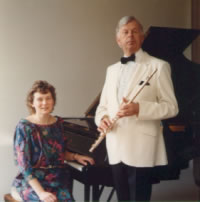| Christopher Hyde-Smith, Jane Dodd & Susan Dorey |
Buy this album CD: £10.00 +p&p |
| SUITE IN C MINOR | JS Bach | |
| 01 | Preludio | 3:09 |
| 02 | Fuga | 4:19 |
| 03 | Sarabande | 4:40 |
| 04 | Gigue & Double | 4:31 |
| SONATA IN F MINOR | Telemann | |
| 05 | Triste | 2:14 |
| 06 | Allegro | 3:56 |
| 07 | Andante | 1:44 |
| 08 | Vivace | 1:44 |
| PARTITA IN A MINOR FOR UNACCOMPANIED FLUTE | JS Bach | |
| 09 | Allemande | 2:44 |
| 10 | Corrente | 2:34 |
| 11 | Sarabande | 3:39 |
| 12 | Bourreé Anglaise | 1:45 |
| SONATA IN B FLAT MAJOR (FITZWILLIAM) | Handel | |
| 13 | Courante | 1:37 |
| 14 | Adagio | 1:26 |
| 15 | Allegro | 2:08 |
| SONATA IN B MINOR FOR FLUTE & HARPSICHORD | JS Bach | |
| 16 | Andante | 7:42 |
| 17 | Largo e dolce | 4:43 |
| 18 | Presto-Allegro | 5:58 |
Sleeve Notes 'The finest flute Sonata in existence' - Spitta wrote in his huge biography of J. S. Bach - the sonata in question is the B minor BWV 1030. This work for flute and obbligato harpsichord is Bach's only sonata in this genre which exists in its entirety. Of Bach's six sonatas published for flute, three are with bass continuo, while of the others the Eb sonata is probably not by Bach and a section of the first movement of the A major has been lost. The B minor sonata is of epic proportions, with a spacious first movement Andante which has such generous sharing of melodic material between the two instruments and wonderful dovetailing. Although paced at a gracious speed the music scarcely stops to draw breath anywhere except for two falterings - trilling into an imperfect cadence, and, near the conclusion of the movement, a hesitation into an interrupted cadence. The Largo has such a divine noble eloquence that the world almost ceases to exist but reality returns with the determined stride of the fugue. This gives way to the excited bustle of a gigue in twelve sixteen time with an off beat character that makes it slightly breathless. Bach's knowledge of the idiom and performance techniques of the flute are so perfectly portrayed in the B minor sonata that it seems an enigma to find only two rests throughout the four movements of the A minor Partita for solo flute (BWV 1013). How strange that the incessant flow of semiquavers in the first movement Allemande is interrupted only momentarily at two points. Even a player with gargantuan lungs has to disturb the sixty- five bar movement to breathe, although with care the wonderful melodic contours preserve their shape. This work is sometimes known as Sonata, but Partita seems a more appropriate title for a set of four dance movements. The first three of these follow the traditional pattern of a Partita or Suite of the period - Allemande, Corrente and Sarabande: only slightly unusual is the Italian style Corrente, rather than Courante. The Sarabande has a slow noble character giving the soloist an opportunity for gracious ornamentation on the reprise. The finale - a Bourree anglaise - has a cheeky air with a syncopated feel in its off beat long notes. How extraordinary that no edition of this work exists without numerous misprints and that in the Sarabande the opening four bars are omitted when the material is repeated. How many memories of the B minor Sonata are stirred on hearing the Suite in C minor. The Sarabande contains a bar which is an exact transposition of one in the Sonata's Largo and the C minor's Gigue has so much of the character of the finale of the B minor work. There are other traits in the Suite which suggest Bach's writing for the flute - the Preludio contains passages similar in style to the Allemande of the Partita: the theme of the fugue is the same as that used in the last movement of the Trio Sonata of The Musical Offering. This suite, which is to be found in Volume 45 of the Bach Gesellschaft mainly containing music for unspecified instruments, is a wonderful vehicle for all the technical and expressive qualities of both the flute and harpsichord -whatever the composer's original intentions! Dance metres and moods are important features of Handel's Fitzwilliam Sonata in Bb major. A gentle Courante forms the first movement while the final allegro has the infectious lilt of the Gigue. Grand solemnity is provided by a brief dramatic central Adagio. The autograph of this sonata is preserved in the Fitzwilliam Museum, Cambridge. Written during the composer's travels in Italy, it gives evidence of Handel the borrower, as movements of this sonata were also used in the opera Scipio, an organ concerto and the A major violin Sonata. Telemann, unlike Handel, was not such a blatant borrower of his own or other composers' material, but, as was the practice of the time, many of his instrumental works were written for alternative instruments. The F minor Sonata on this recording was originally intended for bassoon but Telemann wrote at the beginning,'This solo may be played on the flute a bec' (the recorder). Telemann's music reached a larger and wider audience than Bach's, partly because the former lived in the cosmopolitan seaport of Hamburg. Also, as well as his official church duties, Telemann had the opportunity to compose and perform a wide variety of chamber and orchestral music for various households. Furthermore he interested himself in music publishing regularly producing 'Der Getreue Musikmeister', collections of his own music. This F minor Sonata is one of a set of four for various instruments and continuo published in this periodical and preserved in the Municipal Library, Leipzig. It retains the traditional four movement form (slow-fast-slow-fast) in contrast to Bach's more forward looking three movement structure. Three of these movements portray a single characteristic - the first 'Triste' a noble grief, the third a languidly sighing Andante leading 'attacca' into the triumphant Vivace finale. Only the second movement 'Allegro' has contrast of moods, the gentler middle section offsetting the proud opening. This section is played 'da capo' allowing the soloist scope for ornamentation, a skill that was taken for granted in those days. © Jane Dodd Christopher Hyde-Smith and Jane Dodd, began their regular musical partnership in 1984. The following year they were asked to play the complete works for flute and keyboard of Bach and Handel as part of the City of London Celebrations for the Tercentenary of the birth of these two composers. It seems appropriate, therefore, that their first record together should include three contrasted works of Bach coupled with a Sonata by Handel and one by Telemann who was four years their senior. This husband and wife team has received critical acclaim for its concerts throughout the British Isles, France and Austria. Such comments have been:- "The pair produced an evening of unforgettable music making." "They immediately established a close rapport with the large audience." "By their accomplished, tasteful playing and by the charm and wit of their introductions they consistently commanded the attention of the near capacity audience." The Duo's repertoire includes not only baroque music but also the rich and varied flute and piano repertoire. Their next record to be issued will be 'Flute Music of France' to include music by Fauré, Saint-Saëns, Poulenc and Roussel and some shorter gems never previously recorded. Credits Producers:
Malcolm Russell & Jane Dodd
|
| Instruments: | Flute, Harpsichord and Cello |
| Genre: | Classical |
| Format: | CD |
| Our Ref: | A0013 |
| MCPS: | CR3604-2 |
| Label: | Claudio Records Limited |
| Year: | 1986 |
| Origin: | UK |
Christopher Hyde-Smith & Jane Dodd
Christopher Hyde-Smith and Jane Dodd first performed together at the Stowe Summer School. Here they established an immediate musical rapport and were greatly encouraged by the enormous enthusiasm with which their concerts were received. A regular duo partnership was formed in 1984 following an invitation to play the complete works for flute and keyboard by Bach and Handel as part of the City of London's celebrations for the tercentenary of the births of these composers. Christopher and Jane are familiar from their numerous broadcasts which have included first performances and for their many concerts and masterclasses throughout the British Isles. They recently gave highly acclaimed recitals to capacity audiences at the Arundel and Chester festivals. They have also played in France and Austria. Future plans include broadcasting the complete works of the French composers 'Les Six', and recently rediscovered works of William Alwyn. One of their attractions is their very varied repertoire. In addition to being a pianist Jane has a magnificent double manual harpsichord which she can transport, as well as a portable harmonium and an electric keyboard if the venue dictates. Christopher has flutes in six different pitches, which can be used in one work, as well as demonstrating home-made, baroque and classical flutes. Christopher Hyde-Smith
Christopher Hyde-Smith is a professor of flute at the Royal College of Music, where he also studied. He was the founding chairman of the British Flute Society. He plays on a golden flute. Jane and Christopher were married in 1985 and have two daughters.
'Never in Munich has a flute player had such a success - and well deserved.' SUDDEUTSCHE ZEITUNG '...... he is among the few [flautists] who are in the finest category.' THE GRAMOPHONE
Jane Dodd
After winning numerous prizes at the Royal College of Music and gaining an honours degree at King'sCollege London, Jane Dodd has spent most of her musical life as an 'unashamed accompanist'. She was a prizewinner in competitions organised by Greater London Arts, Park Lane Group, The Incorporated Society of Musicians, The Worshipful Company of Musicians, and The Kirkman Concert Society. Her recital work has included performances at the Wigmore Hall, Purcell Room, Festival Hall, Albert Hail and St. John's Smith Square. Concert partners have included Jack Brymer, James Galway, Ifor James, Felicity Lott, Robert Tear, Hugh Bean and Douglas Cummings and she regularly partners oboist Andrew Knights and is a member of a piano trio. Jane has played for BBC Radio Education Programmes and has three times toured the USA. Work has also included accompanying the choir of St. Martin-in-the-Fieldsand playing as orchestral pianist in the BBC Symphony Orchestra. She is no stranger to masterclasses and has acted as official accompanist at the BBC TV 'Young Musician of the Year' competition. Recently she has been teacher and accompanist at the Purcell specialist music school and her work at summer schools takes her to Ramsgate International Summer School and a summer school in the Austrian Tyrol. Pieces have been dedicated to Jane by composers Dominic Muldowney and David McBride. "Jane Dodd's accompanying was exemplary.' SUNDAY TIMES "In Jane Dodd he has found a rare accompanist, outstanding indeed was the quality of artistry and skill." DAILY TELEGRAPH "Jane Dodd was an unfailing tower of strength throughout a taxing programme." YORKSHIRE POST |
Photographs
by Fritz Curzon |
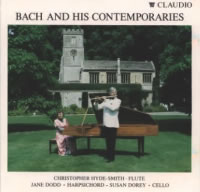 Christopher Hyde-Smith and Jane Dodd, began their regular musical
partnership in 1984. The following year they were asked to play
the complete works for flute and keyboard of Bach and Handel
as part of the City of London Celebrationsfor the Tercentenenary
of the birth of these two composers. 'The recorded sound is excellent:
natural and unobtrusive. Warmly recommended to those who like
their music-making straightforward and unfussy.' Norman
Lebrecht The Daily Telegraph.
Christopher Hyde-Smith and Jane Dodd, began their regular musical
partnership in 1984. The following year they were asked to play
the complete works for flute and keyboard of Bach and Handel
as part of the City of London Celebrationsfor the Tercentenenary
of the birth of these two composers. 'The recorded sound is excellent:
natural and unobtrusive. Warmly recommended to those who like
their music-making straightforward and unfussy.' Norman
Lebrecht The Daily Telegraph.
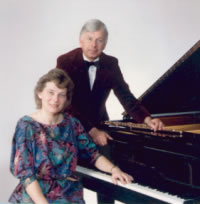
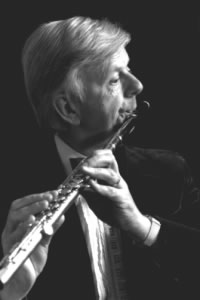 Christopher
Hyde-Smith's flute playing has been compared in the Guardian
to Sir Lawrence Olivier's acting in variety of expression, characterization
and style. He has played all over the British isles and at many
festivals including Aldeburgh, The Three Choirs, North Wales
and York. He has made many trips abroad appearing as soloist
in France, Germany, the Netherlands, Italy, Portugal, Scandinavia,
Spain and Switzerland as well as North and South America. He
has also visited Russia in an ensemble directed by Benjamin Britten.
Other distinguished musicians with whom he has performed include
Casals, Poulenc, Tortelier and Stravinsky. Christopher has played
the Cimarosa Concerto for two flutes with james Galway at the
Royal Festival Hall and as concerto soloist he has frequently
appeared with the London Mozart Players and also with the London
Symphony, Royal Philharmonic, Royal Liverpool Philharmonic, BBC
Concert, Scottish and Welsh Orchestras, Philornusica and Northern
Sinfonia. Many composers have written and dedicated works to
him, among them William Alwyn, Stephen Dodgson, Joseph Horowitz,
William Matthias, John Metcalf and Alan Rawsthorne.
Christopher
Hyde-Smith's flute playing has been compared in the Guardian
to Sir Lawrence Olivier's acting in variety of expression, characterization
and style. He has played all over the British isles and at many
festivals including Aldeburgh, The Three Choirs, North Wales
and York. He has made many trips abroad appearing as soloist
in France, Germany, the Netherlands, Italy, Portugal, Scandinavia,
Spain and Switzerland as well as North and South America. He
has also visited Russia in an ensemble directed by Benjamin Britten.
Other distinguished musicians with whom he has performed include
Casals, Poulenc, Tortelier and Stravinsky. Christopher has played
the Cimarosa Concerto for two flutes with james Galway at the
Royal Festival Hall and as concerto soloist he has frequently
appeared with the London Mozart Players and also with the London
Symphony, Royal Philharmonic, Royal Liverpool Philharmonic, BBC
Concert, Scottish and Welsh Orchestras, Philornusica and Northern
Sinfonia. Many composers have written and dedicated works to
him, among them William Alwyn, Stephen Dodgson, Joseph Horowitz,
William Matthias, John Metcalf and Alan Rawsthorne.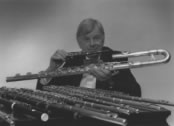 'Christopher
Hyde-Smith is an absolutely first rate flautist...' STEREO
REVIEW, USA
'Christopher
Hyde-Smith is an absolutely first rate flautist...' STEREO
REVIEW, USA